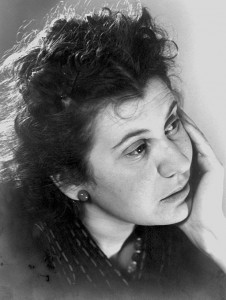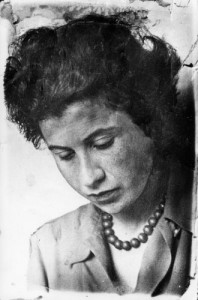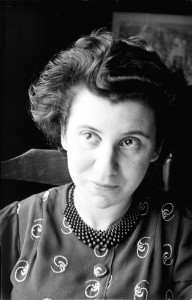“Despite everything, life is full of beauty and meaning.”
― Etty Hillesum
 Etty Hillesum was born in the Netherlands in 1914 to Jewish parents. She died on November 30, 1943, in Auschwitz. She experienced unimaginable loss and hardship, and her life was cut cruelly short. Yet in her short twenty-nine years, she left us an incredible witness to both the indomitable nature of the human spirit and the power of God’s love to sustain a soul through every trial.
Etty Hillesum was born in the Netherlands in 1914 to Jewish parents. She died on November 30, 1943, in Auschwitz. She experienced unimaginable loss and hardship, and her life was cut cruelly short. Yet in her short twenty-nine years, she left us an incredible witness to both the indomitable nature of the human spirit and the power of God’s love to sustain a soul through every trial.
Before wartime, Etty lived a relatively ordinary life—she attended university, studied law but received poor marks, and taught lessons in Russian language and literature while also working as a housekeeper. In the early years of the war, Etty began a diary, recording her innermost thoughts and feelings and processing the unsettling changes that she observed in the world around her. She wrestled with understanding some of life’s deepest questions, and she felt a growing sense of solidarity with the Jewish people. She started to read many spiritual writings and to delve into a faith that extended beyond the bleak world she lived in. Her own identity as a Jew began to carry more and more meaning to her after being forced to wear the Star of David in public. A powerful inner strength began to bloom within her soul, sustaining her hope through difficult times. As the political climate in the Netherlands grew more and more grim, she turned down offers to go into hiding, saying that she wanted to “share her people’s fate.”
Eventually Etty was arrested and taken to Camp Westerbork, a concentration camp in the northeastern Netherlands. While living there, she wrote the following passage:
 “You have made me so rich, oh God; please let me share out your beauty with open hands. My life has become an uninterrupted dialogue with you, oh God, one great dialogue. Sometimes when I stand in some corner of the camp, my feet planted on your earth, my eyes raised toward your heaven, tears sometimes run down my face, tears of deep emotion and gratitude. At night, too, when I lie in my bed and rest in you, oh God, tears of gratitude run down my face, and that is my prayer.
“You have made me so rich, oh God; please let me share out your beauty with open hands. My life has become an uninterrupted dialogue with you, oh God, one great dialogue. Sometimes when I stand in some corner of the camp, my feet planted on your earth, my eyes raised toward your heaven, tears sometimes run down my face, tears of deep emotion and gratitude. At night, too, when I lie in my bed and rest in you, oh God, tears of gratitude run down my face, and that is my prayer.
I have been terribly tired for several days, but that too will pass. Things come and go in a deeper rhythm, and people must be taught to listen; it is the most important thing we have to learn in this life. I am not challenging you, oh God; my life is one great dialogue with you. I may never become the great artist I would really like to be, but I am already secure in you, God.
Sometimes I try my hand at turning out small profundities and uncertain short stories, but I always end up with just one single word: God. And that says everything, and there is no need for anything more. And all my creative powers are translated into inner dialogues with you. The beat of my heart has grown deeper, more active, and yet more peaceful, and it is as if I were all the time storing up inner riches.”
—Etty Hillesum
 It seems nonsensical for anyone to feel so free, so at peace, in a place filled with such horrific suffering and evil. And yet Etty was able to tap into something beyond her surroundings, a spiritual well that still flowed with water even as she walked through the deepest desert imaginable. Her diaries from this time have been published in the book Etty Hillesum: An Interrupted Life and Letters from Westerbork.
It seems nonsensical for anyone to feel so free, so at peace, in a place filled with such horrific suffering and evil. And yet Etty was able to tap into something beyond her surroundings, a spiritual well that still flowed with water even as she walked through the deepest desert imaginable. Her diaries from this time have been published in the book Etty Hillesum: An Interrupted Life and Letters from Westerbork.
Etty’s witness is evidence that we do not need to fear suffering so much as we need to fear separation from God. The things of this world will eventually all pass away—sometimes in terrifying fashion—but if we keep ourselves rooted in the God who transcends all earthly things, we can find a hope that will sustain us through anything we might face. Etty encountered the worst kind of nightmare we can experience in this life; she was brought to the brink of death, and there she found love and joy and gratitude. She became intimately familiar with a paradox of our human existence: the reality that we can find joy in suffering, that there is meaning and beauty in our pain.
Pope Benedict XVI mentioned Etty Hillesum in one of his Wednesday audiences in 2013:
“…I am also thinking of Etty Hillesum, a young Dutch girl of Jewish origin who died in Auschwitz. At first far from God, she discovered him looking deep within her and she wrote: ‘There is a really deep well inside me. And in it dwells God. Sometimes I am there, too. But more often stones and grit block the well, and God is buried beneath. Then he must be dug out again’ (Diaries, 97). In her disrupted, restless life she found God in the very midst of the great tragedy of the 20th century: the Shoah. This frail and dissatisfied young woman, transfigured by faith, became a woman full of love and inner peace who was able to declare: ‘I live in constant intimacy with God’…”
— Benedict XVI, 13 February 2013
As we journey through Lent, let us remember Etty’s example and strive to let go of our worldly attachments in order to nurture our relationship with God. All other things will pass away, but God’s love will always remain. Sometimes it is our journeys through the desert that allow us to see Him more clearly, to cut away the noise that distracts us from His love. Return to Him with your whole heart, and He will sustain you with a peace that transcends all fear, with a love that is stronger than death.






1 thought on “The Transcendent Joy of Etty Hillesum”
Wonderful young woman and great that Pope Benedict mentioned her. For those thinking…what about outside the Church… no salvation. I suspect the treatment of Jews down the centuries by some Catholics rendered some or most of them as being in invincible ignorance of whither the true location of God.
Christ held Jewish leaders responsible at His time based on two things: His words and works….Jn.15: 22 “If I had not come and spoken[j] to them, they would have no sin; but as it is they have no excuse for their sin. 23 Whoever hates me also hates my Father. 24 If I had not done WORKS among them that no one else ever did, they would not have sin; but as it is, they have seen and hated both me and my Father.” In Etty’s life did she see Catholics speak and do great works of love…or was she treated harshly or simply lukewarmly. Benedict seems to have intuited that she did well in her context.
Catholic Answers tangentially deals with how the catechism stresses something not stressed in the past:
http://www.catholic.com/magazine/articles/what-no-salvation-outside-the-church-means